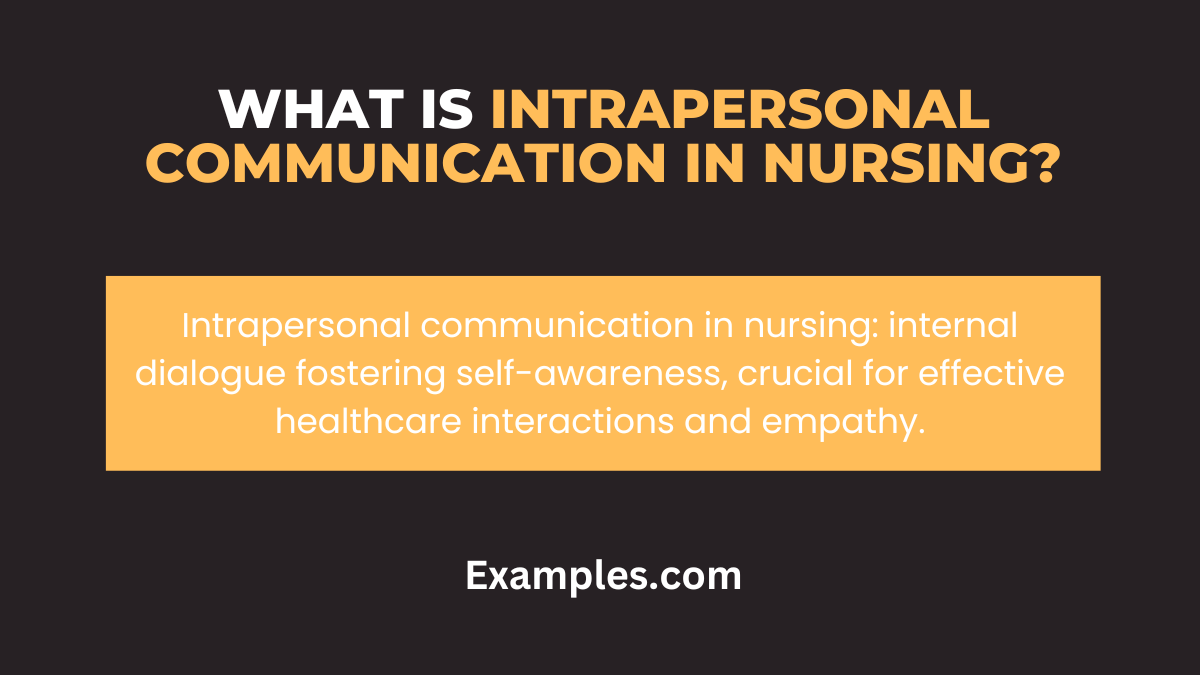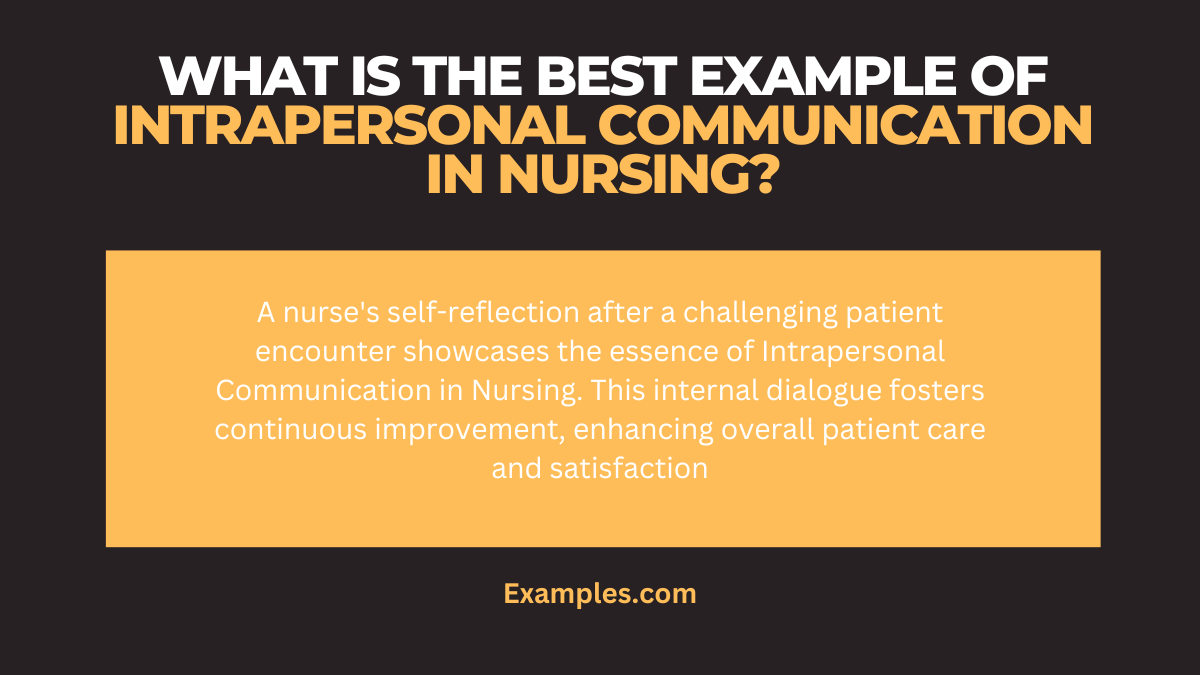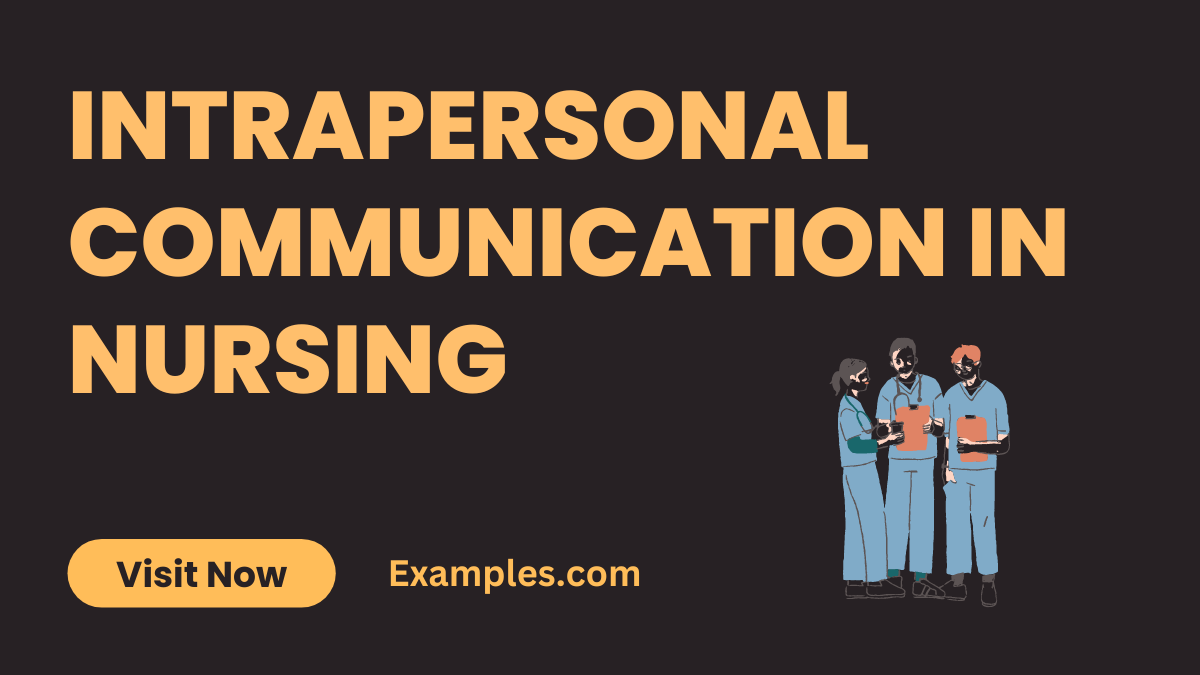14+ Intrapersonal Communication in Nursing Examples
Unlock the key to successful nursing with our comprehensive guide on Intrapersonal Communication in Nursing. This expert-crafted guide delves into essential communication examples tailored for the healthcare setting. Navigate the intricacies of self-awareness, reflection, and effective expression within nursing practice. Elevate your communication skills to foster a positive and empathetic healthcare environment. Embrace the transformative power of Intrapersonal Communication in Nursing through real-life examples and actionable insights. Explore the nuances of communication in healthcare and master the art for enhanced patient care.
What is Intrapersonal Communication in Nursing?

In simple terms, Intrapersonal Communication in Nursing refers to the internal dialogue and reflection within a nurse’s mind. It involves self-awareness, introspection, and understanding one’s thoughts and emotions. This vital aspect of nursing communication lays the foundation for effective interaction with patients, colleagues, and the healthcare team. By comprehending the nuances of Intrapersonal Communication, nurses can enhance their self-awareness, contributing to better patient care and fostering a positive healthcare environment.
What is the best Example of Intrapersonal Communication in Nursing?

One profound example of Intrapersonal Communication in Nursing is the reflective practice undertaken by a nurse after a challenging patient interaction. In this scenario, the nurse engages in internal dialogue, analyzing their emotions, thoughts, and reactions during the encounter. By reflecting on the experience, the nurse gains valuable insights into their communication style, emotional responses, and potential areas for improvement. This introspective process empowers the nurse to enhance their communication skills, fostering better patient relationships and contributing to overall healthcare excellence.
15 Intrapersonal Communication in Nursing Examples

Delve into the world of nursing with 15 exemplary instances of Intrapersonal Communication. This curated collection not only illustrates the diversity of scenarios but also provides actionable insights for effective communication in healthcare.
- Self-Reflection: In challenging moments, nurses employ self-reflection to understand emotions and improve future interactions.
- Emotional Regulation: Managing personal emotions to maintain composure during high-stress situations, ensuring optimal patient care.
- Empathy Development: Nurses cultivate empathy internally, fostering compassionate connections with patients and their families.
- Goal Setting: Setting personal communication goals to enhance interactions and achieve positive patient outcomes.
- Stress Management: Internally navigating stress to maintain focus and provide consistent, high-quality care.
- Conflict Resolution: Resolving internal conflicts to approach workplace disagreements with a clear and composed mind.
- Decision Making: Internal deliberation aids in making informed decisions, crucial for patient welfare.
- Cultural Competence: Reflecting on one’s cultural biases to ensure respectful and inclusive communication.
- Adaptability: Adjusting communication style based on the unique needs of diverse patients.
- Feedback Reception: Internalizing constructive feedback for continuous improvement in communication skills.
- Personal Boundaries: Understanding and maintaining professional boundaries to uphold ethical communication.
- Mindfulness Practice: Incorporating mindfulness to stay present and attentive during patient interactions.
- Effective Listening: Focusing internally on active listening skills to comprehend patients’ concerns thoroughly.
- Assertiveness Training: Building internal assertiveness to communicate needs and advocate for patients.
- Self-Care Communication: Prioritizing internal self-care discussions for enhanced physical and emotional well-being
Intrapersonal Communication in Nursing Healthcare
Unlock the dynamics of Intrapersonal Communication in healthcare settings. This practice involves a nurse’s internal discourse, impacting patient care profoundly. Enhance nursing outcomes by fostering self-awareness, reflection, and effective internal dialogue. Dive into the intricacies of communicating with oneself to elevate the quality of healthcare interactions.
- Self-Compassion Building: Nurses cultivate internal self-compassion, positively influencing their mental well-being and patient care.
- Decisional Confidence: Building internal confidence in decision-making, ensuring swift and effective responses to patient needs.
- Resilience Development: Internalizing resilience for navigating challenges, fostering a positive and adaptable healthcare environment.
- Emotional Intelligence: Nurturing internal emotional intelligence to respond empathetically and connect with diverse patient emotions.
- Autonomous Reflection: Encouraging nurses to autonomously reflect internally, promoting continuous improvement in their communication skills.
Interpersonal Communication in Nursing Practice
Explore the art of Interpersonal Communication within nursing practice, where relationships and patient care intertwine. This dynamic involves the nurse’s interaction with patients, families, and the healthcare team. Master the nuances of building connections, expressing empathy, and fostering collaborative healthcare environments through effective interpersonal communication.
- Active Listening Mastery: Practicing active listening internally, enabling nurses to comprehend patient concerns fully and respond effectively.
- Patient-Centered Dialogues: Focusing on patient-centered internal dialogues to tailor communication strategies to individual patient needs.
- Empathetic Presence: Internally cultivating empathetic presence for patients, promoting trust and comfort in healthcare interactions.
- Collaborative Decision-Making: Internally coordinating collaborative decision-making processes for improved patient outcomes.
- Conflict Resolution Skills: Developing internal conflict resolution skills to navigate disagreements professionally within the healthcare team.
How to Improve Communication Skills in Nursing Leadership?
In the dynamic realm of healthcare, effective communication skills in nursing leadership are paramount. Elevate your leadership prowess with this comprehensive guide, tailored to enhance intrapersonal communication within a nursing leadership context.
1. Self-Reflection for Leadership: Embrace introspection to identify personal communication strengths and areas for growth. Leaders who engage in self-reflection foster a positive communication environment.
2. Empathetic Leadership Practices: Cultivate empathy internally to understand the perspectives of your nursing team. By internally practicing empathy, nursing leaders create a compassionate and supportive work culture.
3. Clear Goal Articulation: Develop the skill of articulating goals clearly within your own thoughts. This internal clarity translates into effective communication when conveying objectives to the nursing team.
4. Stress Management for Leaders: Internally navigate stress to maintain composure and clarity during high-pressure situations, ensuring effective communication and decision-making.
5. Conflict Resolution Mastery: Develop internal conflict resolution skills to approach and resolve conflicts within the nursing leadership realm. Leaders who excel in internal conflict resolution promote a harmonious work environment.
6. Adaptive Communication Style: Cultivate the ability to adapt your communication style internally based on the unique needs of different team members. Versatility in intrapersonal communication enhances leadership effectiveness.
7. Active Listening Skills for Leaders: Internally practice active listening skills to fully comprehend the concerns and ideas of your nursing team. Leaders who actively listen foster open communication channels.
8. Feedback Utilization in Leadership: Internalize feedback received to continuously refine your leadership communication strategies. Constructive feedback contributes to ongoing leadership development.
9. Inclusive Communication Practices: Reflect internally on your communication style to ensure inclusivity. Inclusive leaders foster a diverse and collaborative nursing environment.
10. Mindful Decision-Making: Incorporate mindfulness practices into your decision-making process. Internal mindfulness enables nursing leaders to make well-considered decisions that positively impact the team.
In conclusion, mastering Intrapersonal Communication in Nursing is pivotal for elevating patient care. This comprehensive guide has illuminated the importance of internal dialogue, self-reflection, and empathy. Through diverse examples, nurses can now navigate the complexities of healthcare communication with confidence. Embrace these insights to foster a positive healthcare environment and enhance the overall patient experience.



